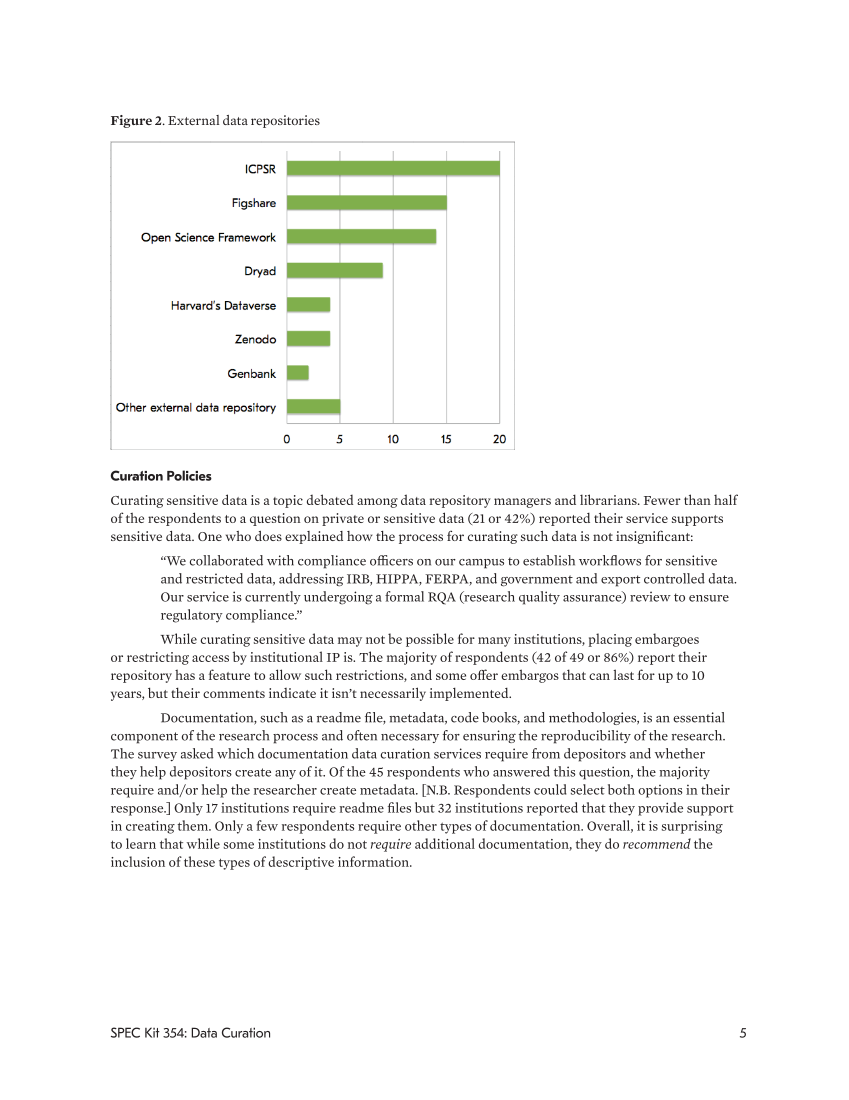5 SPEC Kit 354: Data Curation
Figure 2. External data repositories
Curation Policies
Curating sensitive data is a topic debated among data repository managers and librarians. Fewer than half
of the respondents to a question on private or sensitive data (21 or 42%) reported their service supports
sensitive data. One who does explained how the process for curating such data is not insignificant:
“We collaborated with compliance officers on our campus to establish workflows for sensitive
and restricted data, addressing IRB, HIPPA, FERPA, and government and export controlled data.
Our service is currently undergoing a formal RQA (research quality assurance) review to ensure
regulatory compliance.”
While curating sensitive data may not be possible for many institutions, placing embargoes
or restricting access by institutional IP is. The majority of respondents (42 of 49 or 86%) report their
repository has a feature to allow such restrictions, and some offer embargos that can last for up to 10
years, but their comments indicate it isn’t necessarily implemented.
Documentation, such as a readme file, metadata, code books, and methodologies, is an essential
component of the research process and often necessary for ensuring the reproducibility of the research.
The survey asked which documentation data curation services require from depositors and whether
they help depositors create any of it. Of the 45 respondents who answered this question, the majority
require and/or help the researcher create metadata. [N.B. Respondents could select both options in their
response.] Only 17 institutions require readme files but 32 institutions reported that they provide support
in creating them. Only a few respondents require other types of documentation. Overall, it is surprising
to learn that while some institutions do not require additional documentation, they do recommend the
inclusion of these types of descriptive information.
Figure 2. External data repositories
Curation Policies
Curating sensitive data is a topic debated among data repository managers and librarians. Fewer than half
of the respondents to a question on private or sensitive data (21 or 42%) reported their service supports
sensitive data. One who does explained how the process for curating such data is not insignificant:
“We collaborated with compliance officers on our campus to establish workflows for sensitive
and restricted data, addressing IRB, HIPPA, FERPA, and government and export controlled data.
Our service is currently undergoing a formal RQA (research quality assurance) review to ensure
regulatory compliance.”
While curating sensitive data may not be possible for many institutions, placing embargoes
or restricting access by institutional IP is. The majority of respondents (42 of 49 or 86%) report their
repository has a feature to allow such restrictions, and some offer embargos that can last for up to 10
years, but their comments indicate it isn’t necessarily implemented.
Documentation, such as a readme file, metadata, code books, and methodologies, is an essential
component of the research process and often necessary for ensuring the reproducibility of the research.
The survey asked which documentation data curation services require from depositors and whether
they help depositors create any of it. Of the 45 respondents who answered this question, the majority
require and/or help the researcher create metadata. [N.B. Respondents could select both options in their
response.] Only 17 institutions require readme files but 32 institutions reported that they provide support
in creating them. Only a few respondents require other types of documentation. Overall, it is surprising
to learn that while some institutions do not require additional documentation, they do recommend the
inclusion of these types of descriptive information.















































































































































